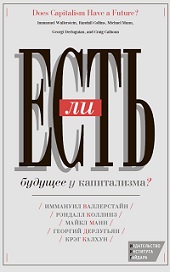Does Capitalism Have a Future?

Immanuel Wallerstein, Randall Collins, Michael Mann, Georgi Derluguian, Craig Calhoun
Translated from English, edited by G. Derluguian. – Moscow: Gaidar Institute Press, 2015. – 320 p.
SBN 978-5-93255-405-0
The end of capitalism was the main expectation of the 20th century on all sides, from socialists to conservatives. Who expected that in 1989 communism would suddenly come to an end, and capitalism would triumphantly enter the era of globalization?
Capitalism has always somehow emerged from crises, and there is no conceivable replacement for it. But this is only an empirical generalization without any theoretical mechanisms. If all the great power structures of the past fell, even Rome, then why will capitalism never fall? The French Revolution, the First World War, the collapse of the USSR became possible precisely because they were not expected.
Five historical sociologists present their five theories explaining why capitalism might collapse (Wallerstein and Collins), how and why capitalism might survive (Mann and Calhoun), where the communist regimes in Russia and China came from, and why they ended so differently (Derluguian).